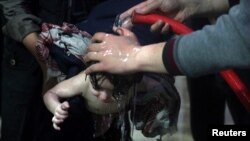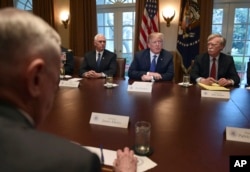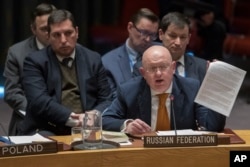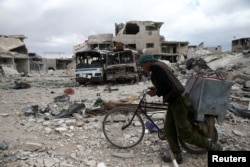U.S. President Donald Trump says his administration will likely say "after the fact" how it decided to respond to a suspected chemical attack on the outskirts of Syria's capital.
"It will be met, and it will be met forcefully," Trump said before meeting with senior military leaders late Monday.
He highlighted what he said was the power of the United States to stop atrocities like the attack Saturday in rebel-held eastern Ghouta that killed at least 40 people.
"We have a lot of options, militarily," he said, without giving specifics. Last year, he ordered missile strikes on a Syrian airfield believed by the U.S. to have been used for the launch of another chemical attack.
Trump was critical of former president Barack Obama for what he said was a failing strategy of publicizing planned military maneuvers ahead of time.
Syria's denial
Syria has denied using chemical weapons throughout the conflict that began in 2011, including the most recent suspected chemical attack. Russia said there is no evidence Syria carried out such an attack. Kremlin spokesman Dmitry Peskov said Tuesday the United States has taken an unconstructive position and is refusing to face reality.
Trump said Monday, "We are getting some very good clarity," regarding who was responsible, a task that has been difficult throughout the Syrian war and the source of conflict among the many international players involved.
Assigning responsibility
Earlier he told his Cabinet at a White House meeting that the U.S. would figure out who was responsible for the attack, whether it was Syria, Russia, Iran or "all of them together."
Assigning responsibility was the domain of investigators from the Joint Investigative Mechanism between the United Nations and the Organization for the Prohibition of Chemical Weapons, which was dissolved after Russia vetoed a renewal of its mandate in November. The United States put forward a new proposal Monday to Security Council members for a new attribution mechanism, but it was not immediately clear whether it would win the necessary Russian support.
U.N. diplomats said the United States was pushing for a vote on the resolution on Tuesday.
U.N. Secretary-General Antonio Guterres urged the council in a statement Tuesday to "redouble its efforts to agree upon a dedicated mechanism for accountability."
He said he is outraged by continued reports of chemical weapon attacks in Syria and called for a thorough, impartial investigation with the OPCW given full access to do its work.
Russian Foreign Minister Sergey Lavrov said later Tuesday that Russia would submit a Security Council resolution proposing OPCW investigators be sent to probe the attack in Syria.
That followed comments from Moscow's envoy Vassily Nebenzia, who said Russian experts have already visited the site, collected soil samples, interviewed witnesses and medical personnel, and that no chemical weapons attack had taken place.
‘Murderous destruction’
U.S. Ambassador Nikki Haley told the Security Council on Monday that both Russia and Iran could stop the Syrian government's "murderous destruction," adding that Moscow's hands are "covered in the blood of Syrian children."
Britain says Foreign Secretary Boris Johnson spoke to Acting U.S. Secretary of State John Sullivan by phone and the two "agreed that, based on current media reports and reports from those on the ground, this attack bore hallmarks of previous chemical weapons attacks by the Assad regime."
French President Emmanuel Macron has also spoken by telephone with Trump several times to coordinate their response to Saturday's attack.
Cecile Shea, a non-resident fellow in global security and diplomacy at the Chicago Council on Global Affairs, also said Syria is likely responsible, citing a lack of other forces capable of manufacturing and deploying such chemical weapons.
"But I think we really need to find out as quickly as we can what the hallmarks of this attack were, and I do believe that we will be able to figure out if it was an attack by the Assad regime," Shea told VOA. "And if it was, then that is an example of a nation violating a treaty that has been in force for 95 years, a general rule of law and just fundamental strictures of humanity. And then I think the president and our allies should take action together to punish whoever did this.
The United Nations refugee agency expressed alarm Tuesday at the continuing violence in Syria, particularly in eastern Ghouta, that is causing deaths and forcing people to leave their homes.
The UNHCR said of thousands of civilians remain trapped in eastern Ghouta after an estimated 133,000 left the enclave during the past four weeks.
The agency reiterated calls for all sides in the conflict to protect civilians and allow them to move freely.








